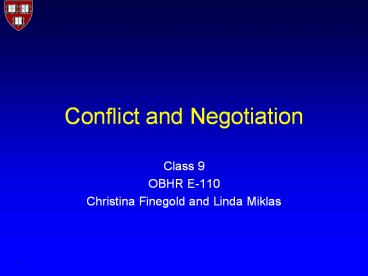Conflict and Negotiation - PowerPoint PPT Presentation
1 / 16
Title: Conflict and Negotiation
1
Conflict and Negotiation
- Class 9
- OBHR E-110
- Christina Finegold and Linda Miklas
2
3 Areas of Interest in Negotiation
Process
Substance
Relationship
Harvard University, Center for Workplace
Development
3
The Problem
- Negotiations often fail
- Deals are not made
- Disputes are protracted
- Relationships are damaged
- Money and time are wasted
4
Possible Causes
- View negotiation as primarily zero-sum in nature.
- Lack a systematic framework for preparing for,
conducting, and analyzing our negotiations. - Unaware of impact of our behavior on others.
- Limited by institutional and cultural norms.
- Trapped by the three Es Ego, Emotions,
Escalation.
5
Common Ways of Defining Success
- Reaching agreement
- Hey! We got a deal! We persuaded the VP to give
us an additional FTE. - Not fighting
- Wow. That was easy. She was friendlier than I
expected. - Equity
- It felt really fair to me.
- Winning
- I did better than he did. He conceded a lot more
than I did. - Breaking their bottom line
- I did great! Stacy agreed to terms much worse
than what she planned.
6
Possible Solutions
- Learn a simple, systematic way to measure success
in negotiation - Prepare using a framework
- Apply a purposeful mindset
- Review your negotiations on your own or with your
counterpart whenever you can to understand what
works well and what you can do differently - Do what you can to make systemic changes within
your department or unit to increase trust and
encourage negotiating for joint gain
7
Traditional Negotiation
Threat to walk
Threat to walk
Harvard University, Project on Negotiation
8
Circle of Value-Based Negotiation
Harvard University, Project on Negotiation
9
Communication
Relationship
Interests
Options
Commitment
BANA
Legitimacy
If No
If Yes
- Assumptions
- Pie can be expanded
- Negotiators should look to create value before
dividing it up
- Assumptions
- Pie is fixed
- Only job of negotiator is to claim value
10
7 Elements of a Negotiation
- Interests What do people really want?
- Options What are the sources to be gained?
- Alternatives (BATNA) What will I do if we do
not agree? - Legitimacy
- Relationship Can I separate people from the
problem? - Communication Am I listening effectively?
- Commitments Have we considered the steps to
implementation?
Source Program on Negotiations, Harvard Law
School
11
7 Elements of a Negotiation
Definition Measure of Success Advice
Interests Needs, concerns, goals Satisfies parties interests Probe for interests ask Why/Why Not?
Alternatives BATNA Better than your BATNA Improve your alternative before negotiations begin make their alternative less appealing
Options All possibilities Expands the pie Separate option generation from evaluation and commitment
Legitimacy External criteria Established standards Criteria sword/shield
Communication Exchange of info and thought Message sent message received Tone-match to audience advocate AND inquire
Relationship Connection between parties Relationship improves or is not harmed Be constructive problem vs. people
Commitment Agreement to will/will not Specific, firm, implementable Use both process and substance commitments not too early
12
5 Conditions of Human Interaction
- Lose-Lose
- Lose-Win
- Win-Lose
- Win
- Win-Win
- Source, The Seven Habits of Highly Effective
People by Stephen R. Covey
13
5 Levels of Conflict
Competing
Collaborating
Assertiveness
Compromising
Accommodating
Avoiding
Cooperativeness
- Source, The Thomas-Kilmann Model
14
A Successful Negotiation
- Meets our Interests well, theirs acceptably, and
others tolerably enough to be durable. - Is the best of many Options.
- Is better than our BATNA.
- Is Legitimate, supported by objective criteria.
- Improves, or at least does not damage the
Relationship. - Is based on clear Communication.
- Identifies Commitments that are specific, firm,
implementable.
15
Case Study
- Introduction and Instructions (5 mins)
- Preparation (10 mins)
- Negotiation (15 mins)
- Debrief
16
Journal Reflection Questions
- What is my comfort level in negotiating outcomes?
- What are my strengths/how do I apply my strengths
in situations requiring negotiation? - How might I develop negotiation skills?
- How would developing negotiation skills benefit
me?































